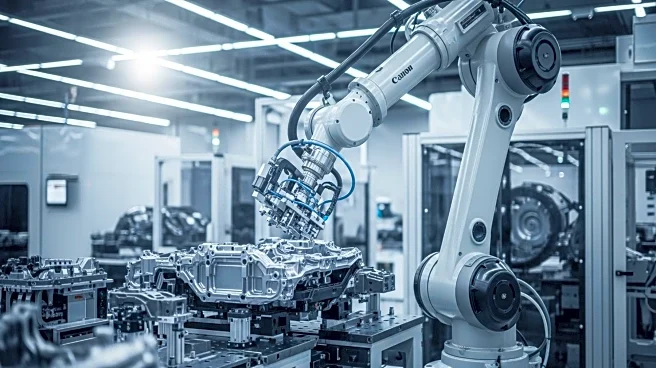What's Happening?
Stellantis, formerly known as FCA US, has unveiled a significant $13 billion investment plan aimed at expanding its manufacturing operations in the United States. This initiative is set to increase domestic
vehicle production by 50% and create over 5,000 jobs across Midwest factories over the next four years. The investment includes the launch of five new models and the reopening of the Belvidere, Illinois plant, which was idled in 2023, to build new Jeep SUVs. Stellantis' new CEO, Antonio Filosa, described the move as a strategic effort to regain sales momentum in the U.S. market, which is critical for the company's global success. The announcement comes amid challenges such as U.S. tariffs, which could cost the company an estimated $1.7 billion this year.
Why It's Important?
The $13 billion investment by Stellantis is a pivotal move in the automotive industry, particularly in the U.S. market. It signals a shift towards localizing production to mitigate the impact of hefty tariffs on imported vehicles, which have been a significant financial burden. By expanding its manufacturing footprint in the U.S., Stellantis aims to enhance its competitiveness and profitability, potentially leading to a resurgence in its market share. The creation of thousands of jobs is also a positive development for the U.S. economy, particularly in the Midwest region. However, the focus on combustion and hybrid models rather than electric vehicles could be risky if consumer preferences shift rapidly towards EVs.
What's Next?
Stellantis plans to implement its investment strategy over the next four years, with the reopening of the Belvidere plant and the introduction of new models being key milestones. The company is also delaying the launch of its new strategic plan to the second quarter of 2026 to address uncertainties in U.S. trade policies and European emissions regulations. Analysts and investors will be closely monitoring Stellantis' financial performance, particularly its third-quarter 2025 shipments and revenues, scheduled for release on October 30. The company's ability to navigate trade barriers and adapt to regulatory changes will be crucial in determining its long-term success.
Beyond the Headlines
Stellantis' decision to prioritize combustion and hybrid models over electric vehicles reflects a cautious approach to the evolving automotive market. This strategy may prove advantageous if EV tax credits fluctuate and consumer demand for traditional vehicles remains strong. Additionally, the investment underscores the importance of strategic localization in manufacturing to avoid trade-related costs. The move also highlights the broader economic implications of tariffs and trade policies on global companies operating in the U.S.









